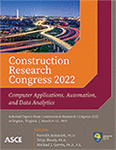A Study on Classifying Construction Disaster Cases in Report with CNN for Effective Management
Publication: Construction Research Congress 2022
ABSTRACT
This study proposes an efficient management direction for Korean construction disaster cases from KOSHA (Korea Occupational Safety & Health Agency) through a text data classification model based on CNN Algorithm. Five classes were defined to classify construction accidents: fall, electric shock, flying object, collapse, and narrowness. After the initial test, the classification accuracy of fall disasters was relatively high, while other types were mainly classified as fall disasters. These results showed that (1) specific accident-causing behavior, (2) similar sentence structure, and (3) complex accidents corresponding to complex types affect the model accuracy. Two improvement experiments were then conducted: (1) reclassification, and (2) elimination of complex accidents. With complex accidents eliminated, the classification performance improved by 185.7%. This result indicated that the multicollinearity of complex accidents was solved during elimination. In conclusion, this study suggests the necessity to manage complex accidents independently while preparing a system to describe the situation of future accidents in detail.
Get full access to this article
View all available purchase options and get full access to this chapter.
REFERENCES
Choi, J. K. (2019). A Prediction Model for Fatal Accidents among Construction Workers using Machine Learning. MS thesis, Sungkyunkwan Univ., Korea.
Chokor, A., Naganathan, H., Chong, W. K., and Asmar, M. E. (2016). “Analyzing Arizona OSHA Injury Reports Using Unsupervised Machine Learning.” Procedia Engineering, 145, 1588–1693.
Dogan, E., Yurdusev, M. A., Yildizel, S. A., and Calis, G. (2021). “Investigation of scaffolding accident in a construction site: A case study analysis.” Engineering Failure Analysis, 120, 105–108.
Hill, B. L. (2017). “Digging for the Big Data Gold in Today’s Construction Projects”, Xpera Group, <https://www.xperagroup.com>(Feb. 20, 2021).
Kim, Y. (2014). “Convolutional Neural Networks for Sentence Classification.” Proceedings of the 2014 Conference on Empirical Methods in Natural Language Processing, EMNLP. 1746–1751.
KOSHA (Korean Occupational Safety & Health Agency). (2016). Guidance on the Record/Classification of Occupational Accidents. KOSHA, Seoul.
Martínez-Rojas, M., Marín, N., and Vila, M. A. (2016). “The role of information technologies to address data handling in construction project management.” Journal of Computing in Civil Engineering, 30(4), 04015064.
Marzouk, M., and Enaba, M. (2019). “Text analytics to analyze and monitor construction project contract and correspondence.” Automation in Construction, 98, 265–274.
Mikolov, T., Sutskever, I., Chen, K., Corrado, G. S., and Dean, J. (2013). “Distributed Representations of Words and Phrases and their Compositionality.” Advances in Neural Information Processing Systems, 3111–3119.
MOEL (Ministry of Employment and Labor). (2021) Statistics of Industrial Accidents 2020. Industrial Accident Prevention and Compensation Policy Bureau, Seoul.
Moon, S., Kim, T., Hwang, B. G., and Chi, S. (2018). “Document Management System Using Text Mining for Information Acquisition of International Construction.” Journal of Civil Engineering, KSCE, 22(12), 4791–4798.
Park, H. J., Song, M. C., and Shin, K. S. (2018). “Sentiment Analysis of Korean Reviews Using CNN - Focusing on Morpheme Embedding -.” Journal of Intelligence and Information Systems, (24)2, 59–83.
Sardroud, J. M. (2015). “Perceptions of automated data collection technology use in the construction industry.” Journal of Civil Engineering and Management, 21(1), 54–66.
You, Z., and Wu, C. (2019). “A framework for data-driven informatization of the construction company.” Advanced Engineering Informatics, 39, 269–277.
Zou, Y., Kiviniemi, A., and Jones, S. W. (2017). “Retrieving similar cases for construction project risk management using Natural Language Processing techniques.” Automation in construction, 80, 66–76.
Information & Authors
Information
Published In
History
Published online: Mar 7, 2022
Authors
Metrics & Citations
Metrics
Citations
Download citation
If you have the appropriate software installed, you can download article citation data to the citation manager of your choice. Simply select your manager software from the list below and click Download.
